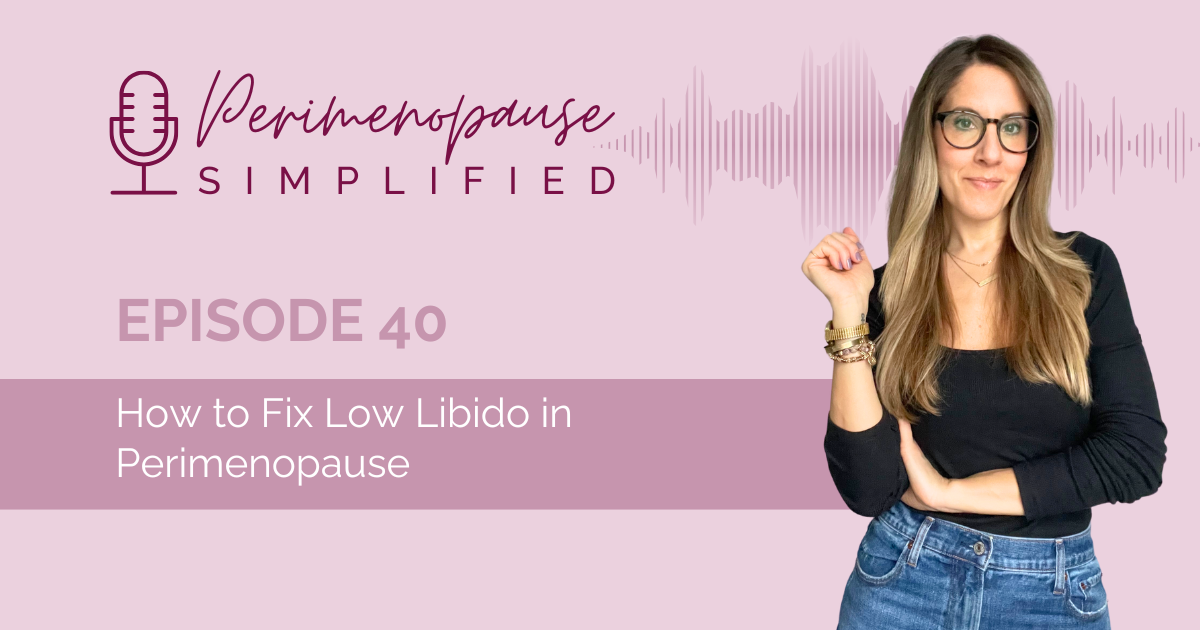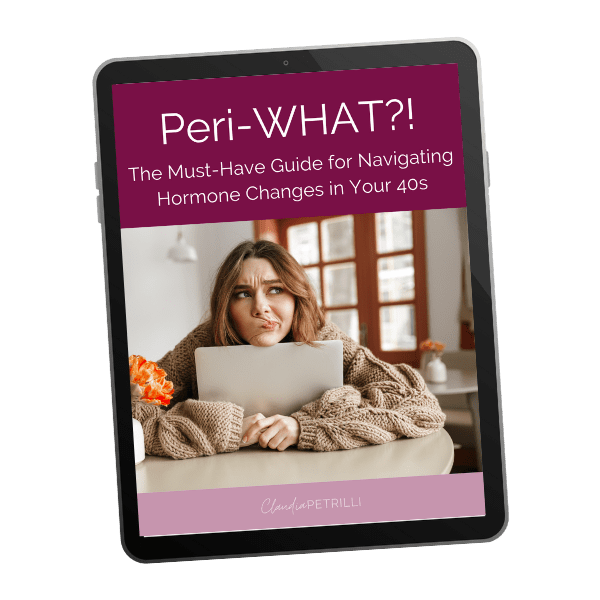
40. How to Fix Low Libido in Perimenopause
Don’t Miss An Episode!
In this episode, we covered:
- Why libido is low in perimenopause
- Why libido is high in perimenopause
- Hormones linked to libido
- Causes of low libido beyond hormones
- How stress and medications affect libido
- Why self care and pleasure is vital
- Communicating with your partner
- Steps to repair libido in perimenopause
- Supplements to consider for low libido
Hey there, welcome to the show. A very common issue our perimenopausal clients deal with is low libido. You may have little to no desire, don’t enjoy sex as much as you used to, and it can impact your relationship because you feel guilty and disconnected. So let’s talk about it!
Understanding Libido
Libido is your sex drive or desire for sex. It can vary from person to person, it can fluctuate over time, and there are many factors that impact it.
Conversely, some women notice an increase in libido in perimenopause, because your ovaries are having a last “hoorah” spiking estrogen, progesterone, and testosterone, before they eventually decline.
But since low libido seems to be more common, let’s dive into that.
The Role of Hormones in Libido
Declining Estrogen
The first major reason for low libido is declining estrogen. Estrogen is responsible for so many things, including the blood flow to our genitals and keeps tissue in that area lubricated and sensitive. When estrogen levels drop, vaginal dryness can occur, making intimacy uncomfortable or even painful—and that can definitely put a damper on libido.
Decreasing Testosterone
Another factor is the decrease in testosterone. Yes, we have and need testosterone too! Testosterone is a key player in maintaining desire. As we transition through perimenopause, our testosterone levels can decrease contributing to low interest in sex.
Low Progesterone
Low progesterone has a calming effect on the brain, can help reduce stress, anxiety and improve sleep. When progesterone levels drop, it can lead to increased anxiety, irritability, or mood swings, which can make it harder to feel in the mood for intimacy. Poor sleep quality can also tank libido.
Other Factors Impacting Libido
It’s not just about hormones; low libido can also be influenced by:
- Fatigue that comes with age and the busy lives we lead
- Chronic stress causing dysregulated cortisol – body is in “fight or flight” mode
- Depression, common in perimenopausal years
- Poor circulation affecting arousal
- Medications such as antidepressants, hormonal birth control, blood pressure meds, pain relievers, antihistamines, or PPIs/antacids
- Elevated prolactin hormone
- Low thyroid function
- Disrupted circadian rhythm due to too much blue light
- Imbalanced blood sugar/insulin resistance
- Relationship factors such as feeling disconnected from a partner
Steps to Support Libido
Diet and Blood Sugar Balance
One of the easiest things to fix is your diet to ensure you have balanced blood sugar because if not, it’ll affect cortisol – go back to previous episodes where I talk about this a lot.
Resetting Your Circadian Rhythm
Resetting your circadian rhythm is essential. Get morning light in your eyes by going outside instead of scrolling your phone. Minimize technology, especially at night, to help your body align with natural light cycles.
Managing Stress and Self-Care
Make time for self-care and stress management. Incorporate daily walks, deep breathing, yoga, meditation, or other calming activities.
Exploring Personal Intimacy and Communication
Do you know how to experience pleasure? Take time to understand your body. Learn what turns you on and communicate that with your partner to improve your connection.
Reconnecting with Your Partner
If you’re feeling disconnected from your partner, explore the reasons why. Are work, family, or distractions interfering? Open up conversations, be willing to explore, and focus on rebuilding emotional and physical intimacy.
Improving Your Bedroom Environment
Switch up your bedroom environment. Keep it relaxing with low lighting, comfortable bedding, and a clutter-free space that promotes intimacy.
Addressing Hormonal Imbalances
Address hormone imbalances: cortisol, low progesterone, testosterone, estrogen, and thyroid hormones. Hormone replacement therapy is an option to consider for optimal well-being.
Additional Suggestions
Phytoestrogen Foods
Experiment with phytoestrogen foods, which can have mild estrogenic effects to support hormone balance. These include soy products, legumes, flax seeds, and other seeds.
Quality Lubricants
If dryness or pain with intercourse is an issue, use a quality lube, especially those with hyaluronic acid for hydration. Lube can enhance comfort and pleasure.
Hormonal Creams
Consider creams with hormones like DHEA or estriol to support vaginal tissue and sensation. Some brands to check out are Bezwecken Ovals and Julva Cream with DHEA.
Supplements for Libido
Some supplements to consider:
- Bonafide Ristella
- Nitric Oxide for healthy blood flow, heart function, blood pressure, and sexual function
CBD for Relaxation
CBD gummies can help you relax, and some also contain libido-supporting herbs like maca and horny goat weed. Check out Viia Hemp and House of Wise for options.
Looking for More Support?
There are many steps you can take to ramp up your libido. If you’re looking for more support, consider working with us in The Hormone Rescue program. And keep an eye out for my new mini-course, Perimenopause HRT Roadmap, coming in November.
As always, I’ll link to any products mentioned in the show notes. See you next time!
Products Mentioned on this Episode:
Sources:
https://pmc.ncbi.nlm.nih.gov/articles/PMC4720522/
https://pmc.ncbi.nlm.nih.gov/articles/PMC4199300/
https://pmc.ncbi.nlm.nih.gov/articles/PMC9165647/
https://pmc.ncbi.nlm.nih.gov/articles/PMC3108697/
https://pmc.ncbi.nlm.nih.gov/articles/PMC8836660/
https://psychiatryonline.org/doi/10.1176/foc.7.4.foc481
Claudia Petrilli is a Functional Health Coach, Integrative Nutrition Coach, Women’s Health Educator, and creator of The Hormone Rescue program. Having experienced debilitating periods, digestive issues, a sluggish thyroid, a pituitary tumor, and perimenopause symptoms in her late 30s, she knows exactly what it’s like to get dismissed by doctors and spend years searching for answers.
Free Resources:
Peri-What?! The Must-Have Guide for Navigating Hormone Changes in Your 40s
Programs:
Connect with Claudia:
Have a question or episode topic suggestion? Please email: claudia@claudiapetrilli.com.
Love the show? Please subscribe, leave a 5-star rating, review, and share with others, so more women can find this podcast for guidance and support through their perimenopause journey!






